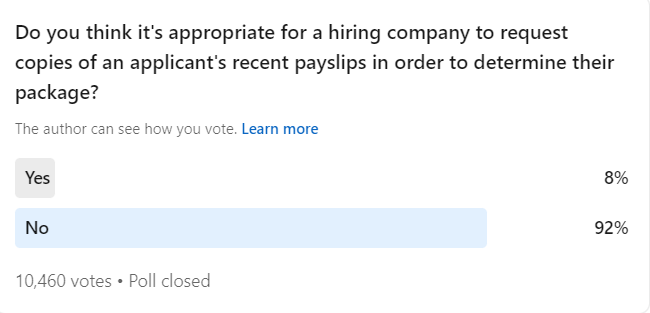Harvey John
Unit 2 Ferry Wharf
Hove Enterprise Centre
Basin Road North
Portslade, East Sussex
BN41 1BD
Is it okay for a hiring company to request an applicant’s recent payslips?
I recently asked this question on a LinkedIn poll and the response was phenomenal. The post was viewed more than 317,000 times and over 10,500 people voted.

The question obviously touched a nerve as the result of the poll was a landslide NO!
So why was the prospect of an employer asking a job-seeker for payslips rejected so firmly?
Impact on salaries
On the face of it, requesting a candidate’s salary seems a fairly sensible request from a hiring company. Finding out how much previous employers have paid is a quick and effective method of judging a candidate’s worth. Of course, the new hire will want an increase, but the previous salary gives an accurate and authentic benchmark.
Arguably, an even better solution could be to see an applicant’s salary history. Steady rises in pay will demonstrate the applicant was successful in previous positions and offers an indication of how a candidate fares when in situ.
So what’s the problem? Why did 92% of respondents reject the idea?
Many expressed the reservation that revealing old pay slips would have a negative impact on a candidate receiving their true value.
Although people move on to new jobs for many reasons, salary is the biggest driver as loyalty isn’t always rewarded in monetary terms. It can be hard for employees to significantly move up from the base salary they were first offered. Annual increases are typically calculated as a percentage of the existing salary and line managers are often limited in how much more they can offer.
In an ideal world, as a person’s skills develop and knowledge accumulates, they’ll be promoted through the ranks. For a myriad of factors, this progression may not happen. Maybe the business is too small to offer an advancement route, perhaps office politics get in the way, or a manager may block promotion. It could even be that the employee is doing their job so well, that there is a reluctance to change their role.
Whatever the reason, if a promotion is not forthcoming, an employee can soon find themselves being underpaid for their level of experience and capabilities.
If you are being underpaid, the worst scenario is your existing salary influencing how much you are paid in your next role.
Many of the LinkedIn post comments made similar points, such as Iestyn Evans (CFO at Monument Corporation) who argued that you “pay for the role, not the body, so why is previous pay relevant? Easy answer – anyone asking wants to pay you as little as possible.”
Gunjan Tripathi (Senior Proposition Manager, Indirect Tax at Thomson Reuters), made the point that a career move is very often an attempt to break a cycle of underpayment: “Candidates should be remunerated for what value they bring to the new employer and not low-balled based on their past employment. By not breaking such cycles, new employers maybe be unknowingly furthering a biased pay scale set by another employer.”
For Taxually’s Head of Sales, Thomas Maas, the salary should be based on experience and the role in question, arguing that we should “pay the position you want the candidate to fill, and that, while there might be a band of experience which will adjust the salary, no payslips are needed.”
An exception to the rule?
When recruiting for a commission-based role, how can you ascertain if the applicant has been successful in reaching targets? This is, arguably, an example of where requesting payslips could be a practical and fair practice – as long as the hirer declares that previous base salaries are ignored.
Avalara’s EMEA Talent Acquisition Manager, Carly Wilson, raised this by highlighting how “there’s a small niche of roles (mainly sales) where it’s helpful to see what commission that person has earned in any tax year. A person’s OTE vs their actual take-home can differ and as recruiters, you don’t always get the whole truth”.
Acknowledging the concerns of requesting payslips, Wilson noted that it is “a shame that sometimes candidates don’t feel they can share their salary” but raised a broader issue that that places emphasis on the “HR/recruitment function to build trust with the candidate so you get a true picture”.
An issue of trust
If a hiring business asks for pay slips as ‘proof’ of salary, does this mean that the business doubts the candidate’s honesty? This was a concern of many respondents to the LinkedIn poll. If a business does not trust the word of a candidate, then perhaps this is not the right company to join at all!
Many saw the demand for payslips as an indicator of poor company culture.
Examples of such reservations were expressed by John Butterworth, who remarked that he would “find it very odd to be asked and it would leave [him] asking serious questions about the culture of the company.”
Equally, the Head of UK Public Relations at Nextbase, Amy Martin, said this practice would be a “huge red flag for her as an employee”.
While there were arguments about how this demonstrates a lack of trust, there is also the view that it is a necessary part of a hiring company’s due diligence and to assess the candidate’s honesty.
Take, for instance, Miriam Wickertsheim’s (General Manager at Direct HR) suggestion that this is an integral element of fact-checking. She reports that “if we ask candidates for their current salary, they say ‘x’, and when we then indicate that the client will ask for salary proof, in around 30% of cases they correct their previous statement downwards.”
It is certainly a dilemma.
Reinforcing inequality
Gender and race gaps remain scandalously high. According to the government, the median gender pay gap was 15.9% in 2020, amounting to a median hourly difference is £4.04.
In 2019, Bangladeshi and Pakistani employees earned 15.3% and 15.5% respectively less than White British employees.
If an employee is in a job where they are paid lower salaries due to their gender and/or ethnicity, then the danger is that this will simply continue.
As Natalie Ainsworth (EMEA Head of VAT at Goldman Sachs) argues, employers must “pay the market rate and not on the basis of what the applicant earns before”, otherwise it “reinforces the gender pay gap”.
Amongst nearly 400 comments on my post, there was much consensus around this view and it’s something that, as a recruiter, I completely agree with.
Personally, reinforcing gender or race pay gaps is, probably, the most compelling argument against basing a salary on previous earnings. Ultimately, the problem will never be solved if mistakes or injustices from the past are constantly repeated. And while a business may see no harm in basing salaries on previous earnings, it is an invisible form of discrimination.
Our poll found that 92% of respondents were opposed to hiring companies asking for payslips to determine salary. Bearing in mind the possibility of cementing inequality, the negative impact on career growth and the erosion of trust, I wholeheartedly agree with the majority decision.
Is it okay for an external recruiter to ask for payslips?
This was a question that Ciprian Arhire (HR Senior Consultant at Capgemini) asked me. So to wrap this blog us, here’s my take:
I am not on board with hiring companies asking for payslips and it’s something I’ve advised against when this request presents itself. However, I do think a recruiter can – and should – look to understand a candidate’s current package.
Hear me out!
I will always ask about one’s current package (of course you are not obliged to tell me!) because, as recruiters, we are uniquely positioned to tell people whether they are underpaid or paid fairly based on market rates.
At Harvey John, we speak to thousands of tax professionals every year and, by asking every candidate their remuneration, the insights we have are very accurate and subsequently play a big role in ensuring there is equality and fairness in their next move.
Ultimately, the more information we have, the better placed we are to advise on the optimum salary range. Information is a valuable tool – the key is to ensure it is used professionally and impartially. A reputable recruiter does just that.
And by speaking to thousands of candidates, we get to know the businesses who don’t respect their staff via pay and will be conscious not to work with them or, if they want to work with us, try to influence change.
As recruiters, it is our job to ensure both the client and the candidate are satisfied with the outcome of the process while ensuring equality and fairness.
One of the benefits of working with a good recruiter is that we will always ensure candidates are being paid fairly and, 90% of the time, get a pay increase.
–
Alex Mann is Associate Director, Indirect Tax & Tax Technology at Harvey John
For expert advice on how to get the best out of your tax career, whether in a professional services firm or in-house, contact us today. Don’t forget to check out our latest tax jobs.
Author

From boutiques to the Big 4, and start-ups to multinational corporations, Alex manages a diverse portfolio of clients worldwide which has enabled him to develop a vast global network of indirect tax and tax technology professionals in 40+ countries.

